

If You Love the Environment, Is It Still Okay to Have a Child (Who Will Have a Carbon Footprint)? In January 2010, Yitta Schwartz of New York died at Mount Sinai Hospital in Manhattan at the age of 93.
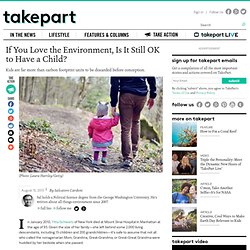
Given the size of her family—she left behind some 2,000 living descendants, including 15 children and 200 grandchildren—it's safe to assume that not all who called the nonagenarian Mom, Grandma, Great-Grandma, or Great-Great Grandma were huddled by her bedside when she passed. Schwartz and her outsized clan were never far from my thoughts last week when I read both a Time magazine cover story, in which author Lauren Sandler lays out the many perks of a childfree life, and Grist writer Lisa Hymas' response to the story, in which she argues that Sandler omits the key factor of reproductive decision-making in 2013—the green angle. The data in support of childfree coupling is irrefutable. The average American generates more than 25 times more C02 per year than the average Bangladeshi, this according to statistics compiled by The Guardian.
George Carlin - Kids [why you shoud stop having too much kids!] Take-Action Toolbox: Curb Overpopulation. Fatalitas ou l'abominable pyramide sociale. Impact de la surpopulation mondiale / ...of overpopulation. Démographie. Démographie en Afrique. 7 Billion and Counting. Our planet has reached a staggering milestone: On October 31, 2011, the world population reached 7 billion people eking out a living.
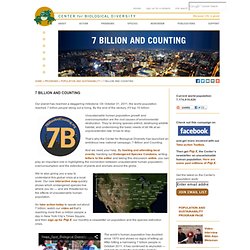
By the end of the century, it’ll top 10 billion. Unsustainable human population growth and overconsumption are the root causes of environmental destruction. World Population Day 2013: 7 Billion Earthlings, and Counting. I made an eye-opening error in commuting yesterday when I walked through Times Square at midday on an incredibly steamy July day.
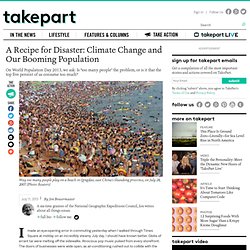
I should have known better. Globs of errant tar were melting off the sidewalks. Atrocious pop music pulsed from every storefront. The doors of businesses were wide open, as air-conditioning rushed out to collide with the exorbitant heat. Faire_des_enfants_ou_pas. Is Humanity Pushing Earth Past a Tipping Point? Could human activity push Earth’s biological systems to a planet-wide tipping point, causing changes as radical as the Ice Age’s end — but with less pleasant results, and with billions of people along for a bumpy ride?
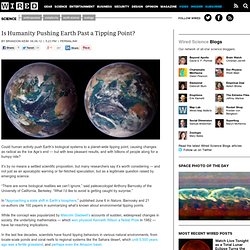
It’s by no means a settled scientific proposition, but many researchers say it’s worth considering — and not just as an apocalyptic warning or far-fetched speculation, but as a legitimate question raised by emerging science. “There are some biological realities we can’t ignore,” said paleoecologist Anthony Barnosky of the University of California, Berkeley. “What I’d like to avoid is getting caught by surprise.” In “Approaching a state shift in Earth’s biosphere,” published June 6 in Nature, Barnosky and 21 co-authors cite 100 papers in summarizing what’s known about environmental tipping points. Deforestation in the Amazon jungle, which some scientists say could become a savannah. “We have quite good evidence for the Earth having tipping elements. Study predicts imminent irreversible planetary collapse - Public Affairs and Media Relations. Contact: Arne Mooers, (Vancouver resident), 778.782.3979, 604.818.1627 (cell), amooers@sfu.ca, skype: arnemooers Carol Thorbes, PAMR, 778.782.3035, cthorbes@sfu.ca Photo on Flickr.
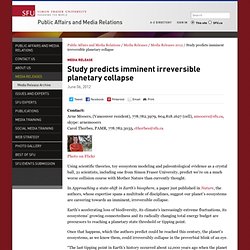
Comment réduire la population mondiale de façon humaine pour éviter la catastrophe environnementale? D’ici quelques années, les ressources existantes ne pourraient plus suffire à la population mondiale, tellement son ascension galopante sera fatale à la survie humaine.
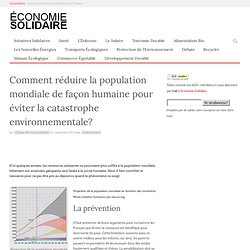
Ainsi, il faut contrôler la naissance pour ne pas être pris au dépourvu quand le phénomène va surgir. Projection de la population mondiale en fonction des continents. Photo Creative Commons par esa.un.org. La prévention Il faut présenter de bons arguments pour convaincre les Français que limiter la naissance est bénéfique pour l’économie du pays. La gratuité Pour trouver les contraceptions adaptées à chaque femme ou homme, les analyses de fertilité doivent être gratuites. Le système chinois… le contrôle forcé! Le système chinois est un peu drastique, mais il faut prendre le bon côté des choses. Dorénavant, réduire au maximum le nombre de naissance est indispensable pour la survie de la race humaine dans un environnement sain. Pouruisvez votre lecture sur : Arrêter de faire des enfants pour sauver la planète? Population mondiale 2011.
Diminution des ressources naturelles. David Attenborough - Humans are plague on Earth. Filmmaker Sir David Attenborough Calls Humans a Plague. LiveScience, January 22, 2013 Filmmaker Sir David Attenborough Calls Humans a Plague By Livescience Staff Sir David Attenborough, the famed British naturalist and television presenter, has some harsh words for humanity.
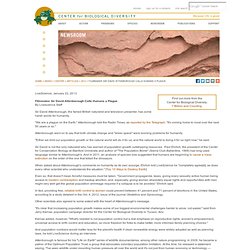
"We are a plague on the Earth," Attenborough told the Radio Times, as reported by the Telegraph. Hillary Clinton tries to silence Bindi Irwin on population growth. News.com.au, January 24, 2013 Hillary Clinton tries to silence Bindi Irwin on population growth By Kristen Shorten PASSIONATE wildlife campaigner Bindi Irwin has gotten into a biff with one of the world's most powerful women.

The 14-year-old has stood her ground after an essay she was invited to write for US Secretary of State Hillary Clinton's e-journal was drastically edited before it was to be published. The young conservationist, daughter of the late "Crocodile Hunter" Steve Irwin, was asked to write 800-1000 words on why she had chosen to devote her life's work to wildlife conservation. The piece was supposed to be published in the December issue titled Go Wild Coming Together for Conservation as part of Secretary Clinton's endangered species initiative.
But after writing exactly 1000 words urging society to address overpopulation, the former first lady's department returned it for final approval with most of it edited out. Florida’s Population Paradox. The Miami Herald, January 7, 2013 Florida’s Population Paradox By Jerry Karnas Explaining why 600 people a day moved to the Sunshine State, the late Florida Senate President Jim King used to say, “Florida is the land of milk and honey.”

The axiom still applies: In December the U.S. Census Bureau confirmed that more people move to Florida every year than to any other state. 50,000 Ways to Start Talking About Population. The Huffington Post, January 23, 2013 50,000 Ways to Start Talking About Population By Jerry Karnas Is it getting crowded in here?
